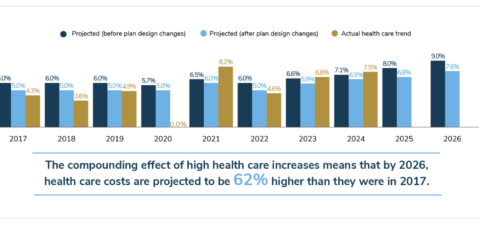If you want to search Cost Curve back issues or link to anything you read here, the web links and archive are online at costcurve.beehiiv.com. You can subscribe there, too.
So I’m on the record as being mildly irritated by beginning-of-the-year price-hike stories, but it’s worth mentioning one nugget that has found its way into the first two articles (from Reuters and Endpoints): Merck dropped the price on Januvia “to align the list price more closely to the net price.”
That’s a continuation of a larger trend, happening in somewhat slow motion, of companies bringing list prices of highly rebated down closer to the net price (largely in asthma and diabetes). STAT has some thinking on the topic this morning, too.
There are a handful of commercial reasons why this is happening, and it probably doesn’t matter in the grand scheme of things.
I don’t want to heap unearned praise on this kind of decision, but given that there has been a ton of unearned derision for list price hikes that didn’t matter in the grand scheme of things, I’m hoping there’s some karmic balance.
Thanks to those of you who send along suggestions in response to my call for 2025 advice. I’m working through the submissions, and here are some early favorites.
The first one to flag is a recommendation aimed at an audience of one:
Maybe a little more humility about the role of drugmakers in high pharma prices. PBMs and 340B hospitals seem to be the only bad guys in the Cost Curve Cinematic Universe.
This anonymous submission made my day, mostly because it suggests that there is a Cost Curve Cinematic Universe. My general defense is that out in the Real Universe, there are plenty of folks talking about the role of drugmakers in high costs.
But scrutiny and accountability is a good way to start a near year, so in the spirit of the submission, here’s an interesting nugget on the way that transparency appears to frighten the drug industry: in the second half of 2024, four companies announced the price of their medicine proactively, via conference call.
In many ways, this is an objectively good thing, but the twist is that in the accompanying slides, the price was never shown. That’s a bit unusual, and it suggests a certain continued level of discomfort talking about the topic.
***
I love this from CF United’s Amanda Boone:
As a rare disease patient who is also an advocate for access to novel breakthroughs and therapies, I would like to emphasize the importance of educating legislators and people in public policy on the real life patient experience. … We are resilient and determined. We have survived on these traits and we will keep pushing forward. We just want to be valued and considered a vital part of the process. Keep a seat at the table open for us.
“Include and consider patient voices” is critical. I hear it all the time, but there’s never as much pullthrough as there could be … or should be.
***
Another anonymous entry got right to the point:
Ignore whatever Trump says he is going to do in the healthcare area.
I don’t want to get political on Trump’s promises, but “ignore politicians” is probably not a bad heuristic in general. Sound advice here.
***
Todd Grove has some counsel for employers:
Go unbundled and evaluate Rx separate from any health plan renewal. Have an attorney well versed in Rx contracts review docs before agreeing to terms.
I feel like every year, there is some beginning-of-January prediction about how this will be the year that employers really flex their muscles on health costs. But it really does seem like Todd’s thinking has some possibility of being taken more seriously this time around.
***
I’m still trolling for more of your thinking. The survey remains open, and you can share your thoughts here. More next week!
Be still my heart! A Relentless Health Value pod with Bill Sarreille? I’d listen to Stacey and Bill discuss grass seed varieties. The fact that they’re talking accumulators and maximizers is just the cherry on top.
I’ve flagged a couple of times a new Independence Blue Cross policy barring reimbursement for 18 months for non-oncology meds approved under accelerated approval. It’s starting to get noticed in the broader press, notably this Endpoints piece. Curious for the perspective of the patient community, especially the rare-disease folks who are probably going to be disproportionately affected. I’ve had a couple of readers point out similar payer policies targeted at accelerated approval, and if you have examples, I’d love to see them.
Cost Curve is produced by Reid Strategic, a consultancy that helps companies and organizations in life sciences communicate more clearly and more loudly about issues of value, access, and pricing. We offer a range of services, from strategic planning to tactical execution, designed to shatter the complexity that hampers constructive conversations.
To learn more about how Reid Strategic can help you, email Brian Reid at brian@reidstrategic.com.





